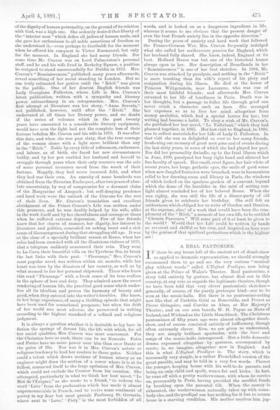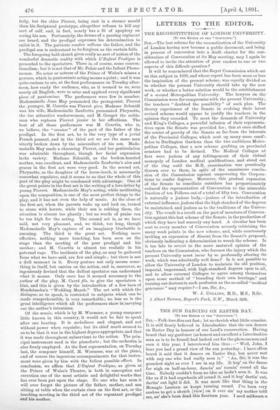A REAL PANTOMIME.
IF there be any lovers left of the ancient art of dumb-show as applied to dramatic representation, we should strongly recommend them to go and see the very curious "musical play without words" called L'Enf ant Prodigue, now being given at the Prince of Wales's Theatre. Real pantomime, a story told entirely by gesture, has almost died out in this country, at any rate as regards the legitimate theatres, though we have been told that very clever pantomimic sketches— generally, of course, of the purely grotesque kind—are to be seen at the musie-halls. But there is no pantomime-acting now like that of Carlotta Grisi as Esmeralda, and Perrot as Pierre Gringoire, and Cerrito as Alma, at Her Majesty's Theatre ; and on our own boards, W. H. Payne as Hans of Iceland, and Wieland as the Little Hunchback. The Christmas pantomimes of fifty years ago were almost altogether dumb- show, and of course consisted entirely of buffoonery, though often extremely clever, Now, we are given to understand, they are simply brilliant spectacles, with the lazzi and songs of the music-halls interspersed. But a little domestic drama expressed altogether by gestures, accompanied by music, is, we imagine, altogether new in England. And this is what L'Enfant Prodigue is. The story, which is necessarily very simple, is a rather Frenehified version of the great parable, and may be told in a very few words. Pierrot the younger, keeping house with his well-to-do parents, and being an only child and spoilt, waxes fat and kicks. In fad, he runs off with a pretty washerwoman, with whom he carries on, presumably in Paris, having provided the needful funds by breaking open the parental till. When the money is exhausted, the washerwoman naturally takes up with some- body else, and the prodigal son has nothing for it but to return home in a starving condition. His mother receives him joy- fully, but the elder Pierrot, being cast in a sterner mould than his Scriptural prototype, altogether refuses to kill any sort of calf, and, in fact, nearly has a fit of apoplexy on seeing his son. Fortunately, the drums of a passing regiment are heard, and the prodigal expresses his determination to enlist in it. The patriotic resolve softens the father, and the prodigal son is understood to be forgiven as the curtain falls.
The foregoing bald sketch gives really no sort of notion of the wonderful dramatic reality with which L'Enfant Prodigue is presented to the spectators. There is, of course, some conven- tionalism; but it is not that of Mr. Folair and the Infant Pheno- menon. No actor or actress of the Prince of Wales's misses a gesture, which in pantomimic acting means a point ; and it was quite curious to see, at the first performance on Tuesday after- noon, how ready the audience, who, as it seemed to us, were nearly all English, were to seize and applaud every significant piece of pantomime. The performers were few in number. Mademoiselle Jane May personated the protagonist, Pierrot the younger, M. Courtbs was Pierrot pre, Madame Schmidt was his wife, Mademoiselle Zanfretta personated Phrynette, the too attractive washerwoman, and M. Gouget the noble- man who replaces Pierrot junior in her affections. The best of all these performers was M. Couras, who is, we believe, the "creator" of the part of the father of the prodigal. In the first act, he is the very type of a jovial French peasant, and in the third act we see the same man utterly broken down by the misconduct of his son. Made- moiselle May made a charming Pierrot, and her gesticulation was admirable throughout, though her facial expression lacks variety. Madame Schmidt, as the broken-hearted mother, was excellent, and Mademoiselle Zanfretta's airs and graces in the first act were very good. In the second act, Phrynette, as the daughter of the horse-leech, is necessarily somewhat repulsive, and it seems to us that the whole of this part of the play might be condensed with advantage. One of the great points in the first act is the writing of a love-letter by young Pierrot. Mademoiselle May's acting, while meditating upon the composition, is one of the most perfect things in the play, and it has not even the help of music. At the close of the first act, when the parents wake up and look on, turned to stone with horror, while their son is robbing them, the situation is almost too ghastly ; but no words of praise can be too high for the acting. The second act is, as we have said, not very pleasant, and, we think, too long, though Mademoiselle May's capture of an imaginary bluebottle is amusing. The third is the great act. Nothing more effective, nothing more touching, has been seen on the stage than the meeting of the poor prodigal and his mother; and M. Courths is almost too realistic in his paternal rage. The incidents of the play, as may be gathered from what we have said, are few and simple ; but there is not a dull moment in it. Every gesture not only means some- thing in itself, but carries on the action, and is, moreover, so ingeniously devised that the dullest spectator can understand what it means. Only once has it seemed necessary to the author of the play, M. Carr6 file, to give the spectators a hint, and this is given by the introduction of a few bars of Mendelssohn's "Wedding March." The art with which the dialogue, so to speak, is restricted to subjects which can be made comprehensible, is very remarkable ; no less so is the great intelligence which all the performers show in:carrying out the author's intentions.
Of the music, which is by M. Wormser, a young composer little known in this country, it would not be fair to speak after one hearing. It is melodious and elegant, and not without power when requisite ; but its chief merit seemed to us to be that it was in the highest degree appropriate, and that it was made throughout subservient to the action. The prin- cipal instrument used is the pianoforte ; but the orchestra is also freely employed. At the first representation, on Tuesday last, the composer himself, M. Wormser, was at the piano, and of course the ingenious accompaniments for that instru- ment were given by him with the fullest possible effect. In conclusion, we affirm that L'Enfant Prodigue, as given at the Prince of Wales's Theatre, is both in conception and execution one of the most artistic and delightful works that has ever been put upon the stage. No one who has seen it will ever forget the picture of the father, mother, and son sitting at table when the curtain rises on the first act, or the touching meeting in the third act of the repentant prodigal and his mother.







































 Previous page
Previous page